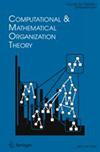信任的政治:信任如何在替代组织中协调自治和团结
IF 1.8
4区 管理学
Q3 COMPUTER SCIENCE, INTERDISCIPLINARY APPLICATIONS
Computational and Mathematical Organization Theory
Pub Date : 2022-04-01
DOI:10.1177/26317877221098769
引用次数: 2
摘要
在本文中,我们探讨了替代组织中的信任政治,被理解为反霸权集体,其特征是对个人自治和集体团结的平等承诺。尽管信任在替代性组织的研究中很少理论化,但它经常被认为是将这些集体凝聚在一起的粘合剂。本文的主要目的是从理论上证实这一说法。借鉴Niklas Luhmann和Ernesto Laclau的观点,我们认为信任在替代性组织中至少有两种功能。首先,对于那些渴望改变现状的人来说,信任是一种认同的对象。这种认同建立在组织与其外部构成要素之间对立边界的创造之上。在这里,信任被理解为通过为个人自治提供空间来建立替代方案的一种方式。我们把这称为信任的政治功能。其次,信任作为一种机制,使原本不可调和的利益和身份得以调和。信任通过暂停现在和未来之间的时间距离来实现这一功能,从而创造了一个广泛的“不确定性时刻”,在这个时刻,对替代意义的不同解释可能共存。在这里,信任被理解为一种通过培养不同个体之间的团结来维持替代的方式。我们把这称为信任的非政治化功能。结合起来,这两种功能允许人们“在一起不同”,这通常被认为是替代组织的必要条件。总之,我们假设信任的这两种功能也可能在主流组织中发挥作用,尽管非政治化功能显然更为普遍。本文章由计算机程序翻译,如有差异,请以英文原文为准。
The Politics of Trust: How trust reconciles autonomy and solidarity in alternative organizations
In this paper, we explore the politics of trust in alternative organizations, understood as counter-hegemonic collectives characterized by an equal commitment to individual autonomy and collective solidarity. Although trust is rarely theorized in studies of alternative organizations, it is frequently claimed to be the glue that holds such collectives together. The main purpose of the paper is to substantiate this claim theoretically. Drawing eclectically on Niklas Luhmann and Ernesto Laclau, we argue that trust serves at least two functions in alternative organizations. First, trust serves as an object of identification for people who long for an alternative to the current state of affairs. Such identification rests on the creation of an antagonistic frontier between the organization and its constitutive outside. Here, trust is understood as a way of establishing alternatives by providing space for individual autonomy. We refer to this as the political function of trust. Second, trust serves as a mechanism that renders possible the reconciliation of otherwise irreconcilable interests and identities. Trust fulfils this function by suspending the temporal distance between present and future, thereby creating an extensive ‘moment of undecidability’ in which competing interpretations of what it means to be alternative may coexist. Here, trust is understood as a way of maintaining alternatives by cultivating solidarity between diverse individuals. We refer to this as the depoliticizing function of trust. Combined, these two functions allow people to be ‘different together’, which is often claimed to be the sine qua non of alternative organizing. In conclusion, we hypothesize that both functions of trust may be operative in mainstream organizations as well, although the depoliticizing function is clearly more prevalent.
求助全文
通过发布文献求助,成功后即可免费获取论文全文。
去求助
来源期刊

Computational and Mathematical Organization Theory
COMPUTER SCIENCE, INTERDISCIPLINARY APPLICATIONS-MATHEMATICS, INTERDISCIPLINARY APPLICATIONS
CiteScore
3.80
自引率
16.70%
发文量
14
审稿时长
>12 weeks
期刊介绍:
Computational and Mathematical Organization Theory provides an international forum for interdisciplinary research that combines computation, organizations and society. The goal is to advance the state of science in formal reasoning, analysis, and system building drawing on and encouraging advances in areas at the confluence of social networks, artificial intelligence, complexity, machine learning, sociology, business, political science, economics, and operations research. The papers in this journal will lead to the development of newtheories that explain and predict the behaviour of complex adaptive systems, new computational models and technologies that are responsible to society, business, policy, and law, new methods for integrating data, computational models, analysis and visualization techniques.
Various types of papers and underlying research are welcome. Papers presenting, validating, or applying models and/or computational techniques, new algorithms, dynamic metrics for networks and complex systems and papers comparing, contrasting and docking computational models are strongly encouraged. Both applied and theoretical work is strongly encouraged. The editors encourage theoretical research on fundamental principles of social behaviour such as coordination, cooperation, evolution, and destabilization. The editors encourage applied research representing actual organizational or policy problems that can be addressed using computational tools. Work related to fundamental concepts, corporate, military or intelligence issues are welcome.
 求助内容:
求助内容: 应助结果提醒方式:
应助结果提醒方式:


